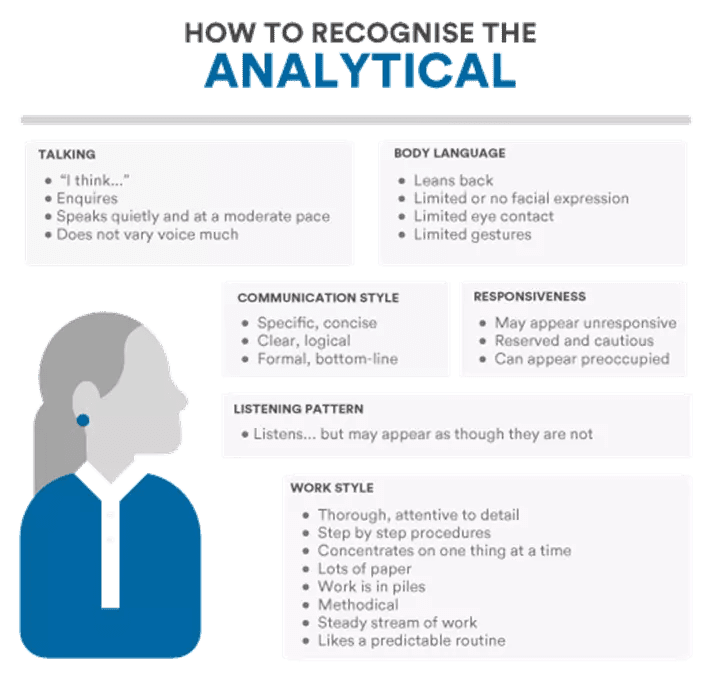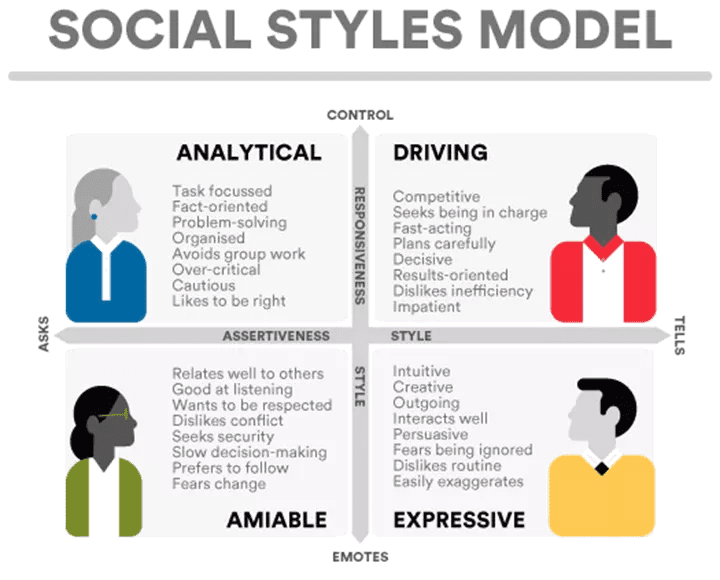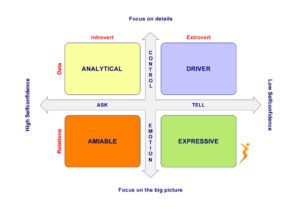
What is the Analytical Personality Type?
The Analytical Social Personality Type is Low in both Assertiveness and Responsiveness. Analytical-type people are task-oriented, use objective reasoning, and are well-organized, independent, and cautious.
Analytical Personality Type cross-reference
- Keirsey Type – Guardians
- Temperament Type – Melancholy
- Animal Type – Beaver
- DISC Type – Compliant
- True Colors – Gold
- Color Code – White
- Personality Compass – East
- Occupational Type – Realistic
- Learning Type – Pragmatist
- Leadership Type – Avoider
MBTI Personality Types (xSxJ) – Sensing and Judging
Enneagram Types
- Type 1 – The Reformer (All Judging)
- Type 2 – The Helper (ESFJ, ISFJ)
- Type 6 – The Loyalist (All Sensing)
- Type 8 – The Challenger (ESTJ)
What are the 4 Social Personality Types?
There are four behavioral-focused Social Personality Types based on your level of Assertiveness and Responsiveness. It’s your personality that’s on display!
In the early 1960s, two industrial psychologists, David Merrill and Roger Reid, wanted to understand whether they could predict managerial, leadership, and sales performance. To do this, they explored how people behaved in social situations and chose not to concern themselves with why.
Merrill and Reid started with BF Skinner’s ideas of behaviorism and James Taylor’s structured list of behavioral descriptions, and they discovered that people’s behavior follows along two continua, which they labeled Assertiveness and Responsiveness.
Assertiveness Style
The Assertiveness Style ranges from asking behaviors to telling behaviors, while the Responsiveness Style varies from emoting or displaying our feelings to controlling our emotions.
Assertive people can initiate, maintain, and terminate conversations skillfully. They are competitive, dominant, forceful, and independent.
Responsiveness Style
Responsive people are others-oriented, meaning they listen to others and show a general concern for their success. They are helpful, compassionate, friendly, sincere, and considerate of others’ feelings.
An individual’s level of Assertiveness and Responsiveness determines their Social Style.

Learn more about the 4 Social Personality Types.
The Analytical Personality Type
Traits
- Task-oriented
- Objective-reasoning
- Organized
- Independent
- Cautious
Motivation
- The Facts and Details.
Under-stress
- May become avoiding and autocratic.
Analytical Type Communication Styles
- Please make an effort to be accurate and support their principles and thinking.
- Try to be logical and systematic.
- Try to be a good listener.
- Be prepared to answer “Why” questions.
When the Analytical communicates with an Amiable
Relate to your cooperative and conservative nature, accuracy, and patience.
- Question your lack of warmth and close relationships and your dependence on figures.
- Show your interest in them as people rather than as workers.
- Use their skills as mediators to build relationships inside the organization.
- Please help them perceive the big picture and how they relate to it.
When the Analytical communicates with an Expressive
Relate to your cooperativeness and dependability.
Question your dependence on facts, criticalness, stuffy nature, impersonal approach, and lack
of fun.
Working with this Style will require you to exercise your versatility.
- Spend informal time with them.
- Recognize their need for package sales, incentives, and contests.
- Ask for their opinions and input on a noncritical, accepting basis.
When the Analytical communicates with a Driver
Relate to your logic, command of data, accuracy, and dependability.
Question your overabundance of facts, lack of decisiveness, and lack of risk-taking.
- Summarize the facts and various outcomes; let them decide.
- Depend on self-discipline rather than on excessive reports or precise instructions.
- Recognize results with monetary rewards.
When the Analytical communicates with another Analytical
Perceive you as thoughtful, wanting more facts, conservative, quiet, critical, logical, relaxed toward
others, thorough, cooperative, distant, reserved, stern, austere, dependable, and accurate.
Recognize the need to make timetables and reach decisions.
Reinforcing one another’s desire for more information may form a self-perpetuating cycle that does not produce results.
Analytical Type Action Plan
| Analytical Characteristics | So You |
|---|---|
| They don’t respond to aggressive approaches. | Approach them in an indirect, non-threatening way. |
| They think logically. | Show your reasoning. |
| They seek data. | Please give it to them in writing. |
| They need to know the process. | Provide explanations and rationale. |
| They like to utilize caution. | Allow them to think, inquire and check before the make decisions. |
| They prefer to do things themselves. | When delegating, let them check on others’ progress and performance. |
| They want others to notice their accuracy. | Compliment them on their thoroughness and correctness when appropriate. |
| They gravitate toward quality control. | Let them assess and be involved in the process when possible. |
| They like to avoid conflict. | Tactfully ask for clarification and assistance you may need. |
| They need to be correct. | Allow them time to find the best or correct answer within available limits. |
| They like to contemplate. | Tell them why and how. |
Portrait of an Analytical Office
The first thing you will probably notice is the glasses. The Analytical will have worn out their eyes from constantly reading everything.
You may see a framed degree on the wall, but the chief decoration will be charts, figures, and graphs of every kind.
The Analytical is not very friendly, will often greet you skeptically, and doesn’t want to share much – especially anything personal.
There will be no flowers or plants; for the Analytical, they belong in greenhouses.
Only carefully arranged business-related information will be on the desk.
It’s not a power office, but it definitely will be functional.
As for color, black and white will do nicely.

